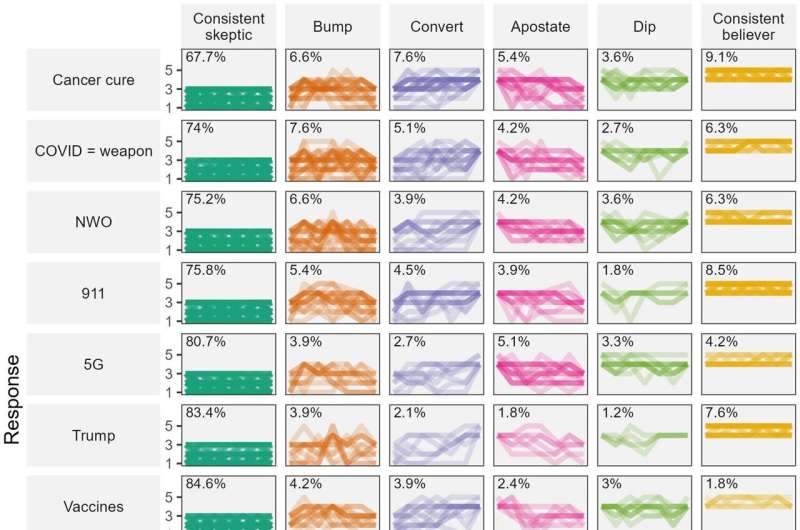This article has been reviewed according to Science X's editorial process and policies. Editors have highlighted the following attributes while ensuring the content's credibility:
fact-checked
trusted source
proofread
People do change their beliefs about conspiracy theories—but not often, says study

From 9/11 to COVID, researchers including La Trobe University's Dr. Mathew Marques, Senior Lecturer in Psychology, surveyed just shy of 500 Australians and New Zealanders over the course of six months to determine whether people change their minds frequently or stick tenaciously to their beliefs, regardless of what evidence they come across.
The participants were presented with 12 theories related to claims about events that are ongoing or occurred this millennium including, the September 11 attacks "caused by controlled demolitions arranged by U.S. government insiders," the rollout of 5G telecommunications technology, chemtrails and the 2020 U.S. Presidential election.
The study is published in the journal Scientific Reports.
Dr. Marques said most participants tended to disagree with the presented theories however, there were some consistent believers in the sample and a small proportion whose beliefs fluctuated.
"I think the notable finding from our study revealed that for every conspiracy theory, there was also a small proportion of converts," Dr. Marques said.
"They disagreed with the theory at the start of the study but agreed with it by the end. There was also a small group of apostates, that is people who agreed with the theory at the start but later changed their mind.
"Overall, however, the percentages of converts and apostates were offset, leaving the proportion of believers fairly stable over time."
The study's most popular unwarranted conspiracy theory was that "pharmaceutical companies have suppressed a cure for cancer to protect their profits," with 18% of the sample group agreeing when first asked.
Only 2% of the sample agreed that "COVID-19 vaccines contain microchips to monitor and control people," resulting in the least popular theory.
This was despite the data collection occurring in 2021, during the tumultuous second year of the COVID pandemic, where lockdowns and mandates were still happening in both Australia and New Zealand and anti-government sentiment was building.
"It takes a fairly big event, crisis or change to someone's life or circumstances to push people to believe in something counter to what they believed already," Dr. Marques argued.
The study highlighted that explanations for believing conspiracy theories must consider why belief levels differ significantly among individuals rather than within.
"People developing beliefs in a succession of conspiracy theories are often characterized as falling down a 'rabbit hole'—a reference to Lewis Carroll's Alice's Adventures in Wonderland," Dr. Marques concluded.
"While it's possible that does happen for a small number of people, our results suggest this isn't a typical experience.
"For most, the journey into (or out of) conspiracy theory belief might involve a more gradual slope. A bit, perhaps, like a real rabbit warren."
More information: Matt N. Williams et al, People do change their beliefs about conspiracy theories—but not often, Scientific Reports (2024). DOI: 10.1038/s41598-024-51653-z
Provided by La Trobe University




















